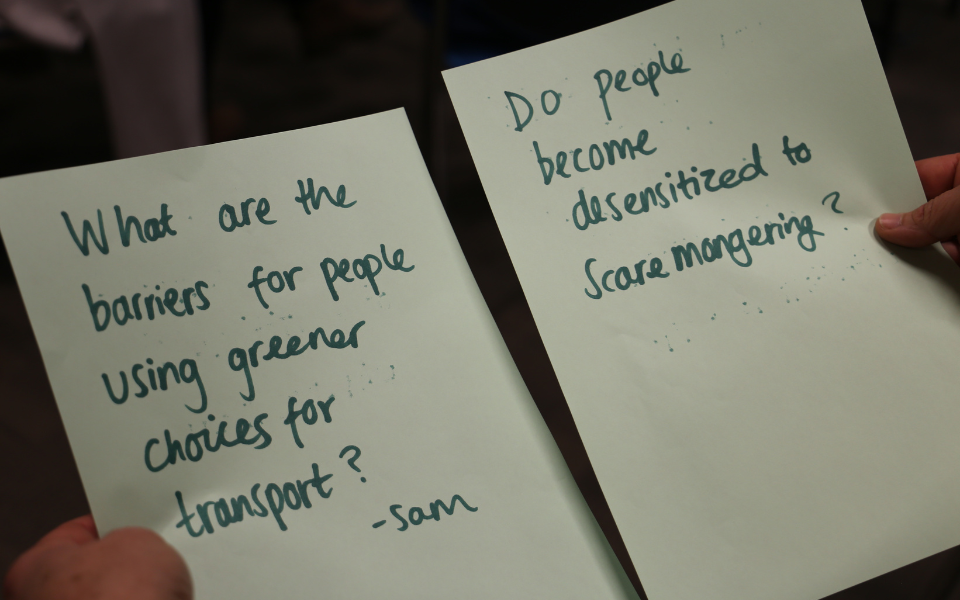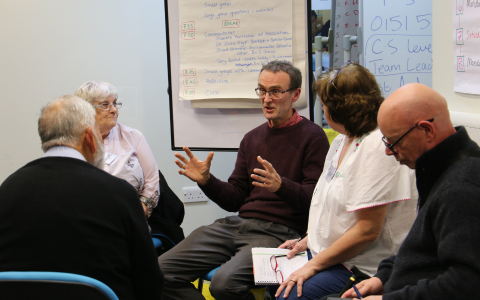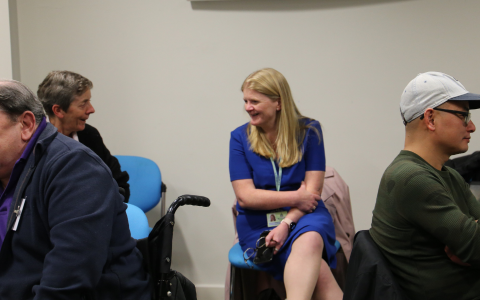
Published Tuesday 1 November 2022 at 13:48
This week, the People’s Jury took an in-depth look at climate change communications and education, with discussions and case studies from experienced academics and local experts.
With three key areas of focus now being selected – communications and education, transport and housing – the Jury are attending spotlight sessions on each theme; in preparation for writing their recommendations on what can be done locally in response to the climate change crisis.
The evening kicked off with an online presentation from Dr Stuart Capstick, Deputy Director and theme lead for the Centre for Climate Change and Social Transformation (CAST Centre) and Research Fellow at Cardiff University.
Dr Capstick discussed his top 10 tips on how best to communicate climate change with the Jury. Listen to him share them in the video below, including case studies and examples. You can also find more information at The Climate Change Comms Project website.
Jury members then had the chance to ask Dr Capstick a range of questions, gathering further information on ‘scaremongering’ in climate change communications, how best to communicate with young people and what age groups are generally most receptive to information around climate change.
This was followed by four snappier presentations from a variety of speakers, each giving a brief insight into their relevant organisation and how they each engage with audiences on climate change.
First was Chandra Pankhania from the Soil Association, a long-established UK charity who work to transform the way we eat, farm, and care for our natural world. Chandra spoke about the need to educate community groups on food and food systems, and the balance of food both contributing to and being heavily impacted by climate change.

Chandra Pankhania, from the Soil Association, with Jury members.
Next, Cllr Jackie Floyd, co-founder of Keep Blackburn Tidy and Billinge and Beardwood Ward Cllr, empowered the Jury by sharing information around how you can encourage people to “join your tribe and get stuff done” (skip to 05:55).
Policy and Performance Manager for Environment at Blackburn with Darwen Council, Stuart Hammond, then gave some insight on what Council objectives are with current communications around waste and recycling. Key focuses include encouraging food waste reduction, decreasing recycling contamination and stopping littering (skip to 10:45).

Jury chat with Stuart Hammond, Policy and Performance Manager for Environment at Blackburn with Darwen Council.
Finally, the Jury heard from Gary Buckett, Health, Safety and Environment Manager at Blackburn College. Gary discussed how the colleges plans to embed sustainability into their culture, with steps towards this including connecting with and investing in local communities, as well as adapting the syllabus to allow for more teaching/training on sustainable solutions (skip to 17:15).
After these talks, the Jury had the chance to sit down with a speaker of their choice in small groups, allowing for a more informal chat between participants and presenters to understand organisations or topics better.
The session finished with the Jury making notes on key reflections or thoughts, to revisit when they come to shaping their final recommendations.
Chief Executive of Blackburn with Darwen Borough Council, Denise Park, also attended the session as an observer. She said:
It’s clear to see the Jury members have a genuine passion for the task at hand and are already engaging in productive and thought-provoking conversations with one another.
I very much look forward to seeing their recommendations at the launch event in January next year. I’m sure there will be content to inspire our whole borough to work towards a greener future, together.

Jury members will meet for 30 hours between September and December 2022, with the task of forming a set of recommendations on what organisations and residents across the borough could be doing to help tackle the issue of climate change.
An Oversight Panel made up of local stakeholders and partners, including organisations such as UCLan, Community CVS, Youth Zone and the Lancashire Council of Mosques, has also been assembled to ensure a fair and rigorous process is maintained and that local partners have a role within this journey too. View all Oversight Panel members here.
The new People’s Jury is part of Blackburn with Darwen Council’s climate action plan, with the aims that it will drive local investment in the work and ensure residents and organisations are very much part of this journey.
The sessions are being facilitated and run by Shared Future CIC, one of the UK’s leading experts in organising People’s Juries.
Initially, more than 6000 letters were sent out to randomly selected households in the borough inviting them to register to take part in the jury.
Those who applied were subject to a thorough selection process to ensure there’s a diverse range of people – with 32 members reflecting the local population of Blackburn with Darwen in terms of age, gender, ethnicity, disability, where people live and attitude to climate change.
Follow the latest updates from each session on The Shuttle.
